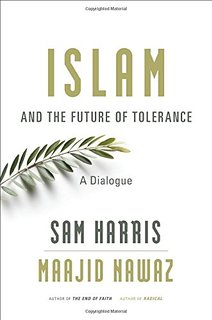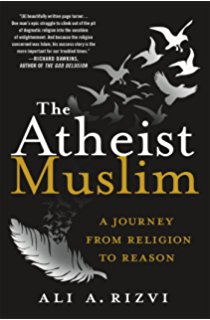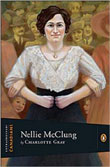Authors Leading Vital Conversation About Islam
Brandon Sun, February 22, 2016 –
David McConkey
One book, jointly written by Sam Harris and Maajid Nawaz, is Islam and the Future of Tolerance: A Dialogue. The other, by Ayaan Hirsi Ali, is Heretic: Why Islam Needs a Reformation Now.
Harris, Hirsi Ali and Nawaz are tackling a huge global issue. Islam has 1.6 billion followers worldwide, including millions in Europe and North America. Because of beliefs and numbers, the risk is great for terrorism. Even if only a small percentage support the suicide bombing or mass shooting of civilians, for example, that is millions of people.
 And within Muslim communities, backward ideas are commonplace. For
example, three-quarters of Muslims in Pakistan favour the death penalty
for someone who leaves the religion.
And within Muslim communities, backward ideas are commonplace. For
example, three-quarters of Muslims in Pakistan favour the death penalty
for someone who leaves the religion.The three authors bring diverse perspectives to their work. Harris is a U.S. neuroscientist, philosopher and author. An atheist, his most recent previous book was Waking Up: A Guide to Spirituality Without Religion.
Hirsi Ali was born in Somalia and grew up in Africa and Saudi Arabia. She now lives in the U.S. Her previous book was Nomad, which I reviewed here in 2010.
Nawaz is British; his parents immigrated to the U.K. from Pakistan.
Hirsi Ali and Nawaz were both raised as Muslims and know Arabic. Both became radicalized as teenagers. Hirsi Ali is now a nonbeliever; Nawaz is now a liberal Muslim. They currently are human rights activists and work to modernize Islam. Nawaz cofounded the counter-extremism think tank Quilliam, and authored the book “Radical: My Journey out of Islamist Extremism.”
Although the three writers sometimes have differing views, I note six themes that flow through their work. The first theme is an observation: Islam has become more radical in recent decades. This is especially because of the global proselytizing effort of Saudi Arabia.
A second theme is the importance of modern democratic values – like women’s rights and the freedom of expression and of religion. These values are universal. They are good not just in Western countries like Canada; but in all places – including those with a Muslim majority.
 Third: although an ideal could be that all Muslims leave the faith and
become atheists, this is just not going to happen. So, we need
practical approaches to move humanity toward a global civil society.
One way is to have frank discussions, like the Harris / Nawaz dialogue.
Third: although an ideal could be that all Muslims leave the faith and
become atheists, this is just not going to happen. So, we need
practical approaches to move humanity toward a global civil society.
One way is to have frank discussions, like the Harris / Nawaz dialogue.Fourth: the theology of Islam can easily be used to justify terrorism. Perhaps most important is the Muslim obligation to wage jihad – holy war. Another, in the words of Harris, is that the Qur’an is filled with “a hatred and fear of infidels.” Also, he says, the “promise of paradise, which explicitly devalues life in this world.” These beliefs – and many more – need to be re-interpreted and revised in the light of modern understandings.
Fifth: radical Islamists must be identified and isolated. The Harris / Nawaz book provides a useful context. Islam is just a religion; if restrained within modern values, it can be as innocuous as any other faith. But a big problem is “Islamism,” which Nawaz says is the desire to impose one version of Islam on the rest of society. An even bigger problem is “jihadism,” which Nawaz defines as the use of force to spread Islamism.
A sixth theme concerns two mistakes that non-Muslim Westerners make. One is a failure to recognize the wide diversity of interpretations of Islam – in fact, there is no central religious authority. The other is a reluctance to acknowledge that Islamic religious beliefs are the basis of jihadism. Liberal-minded Westerners who want to be culturally sensitive can end up inadvertently supporting extremism; Nawaz calls them the “regressive left.”
There is a related priority: lending support to those within Muslim communities who are working for change. These include political and theological reformers, public intellectuals, bloggers, apostates, freethinkers, feminists, and gay rights advocates.
Harris, Hirsi Ali and Nawaz are leaders in a growing global conversation. They are young: in their thirties or forties. So – unless killed by jihadists – they should have a continuing influence far into the future.
This conversation about Islam is vital. All of us are invited to learn and take part as global citizens.
* *
* *
See also: Sam Harris on Amazon.com (on Amazon.ca)
Ayaan Hirsi Ali on Amazon.com (on Amazon.ca)
Maajid Nawaz on Amazon.com (on Amazon.ca)
Reading the Qur’an Key to Understanding Islam
ISIS and the Terrifying Power of Bad Ideas
Book Provides Intriguing, Scientific Glimpse into State of Religious Beliefs
Book Looks at Islamic World
Other Reviews
QUICK CONTACT:
David McConkey,
Brandon, Manitoba
Send me an email
My Sites / Interests
- Citizen Active
- Columns
- The Great War
- Live Well, Do Good
- Manitoba History
- Obituary Guide
- Reviews
- The War on Drugs
Some Reviewed Books:
The War on Drugs:
A Failed Experiment

The Atheist Muslim:
A Journey from Religion to Reason

Stranger Than We Can Imagine:
An Alternative History of the 20th Century
Heretic:
Why Islam Needs a Reformation Now
Islam and the Future of Tolerance:
A Dialogue

Extraordinary Canadians:
Nellie McClung

The Greatest Show on Earth:
The Evidence for Evolution


